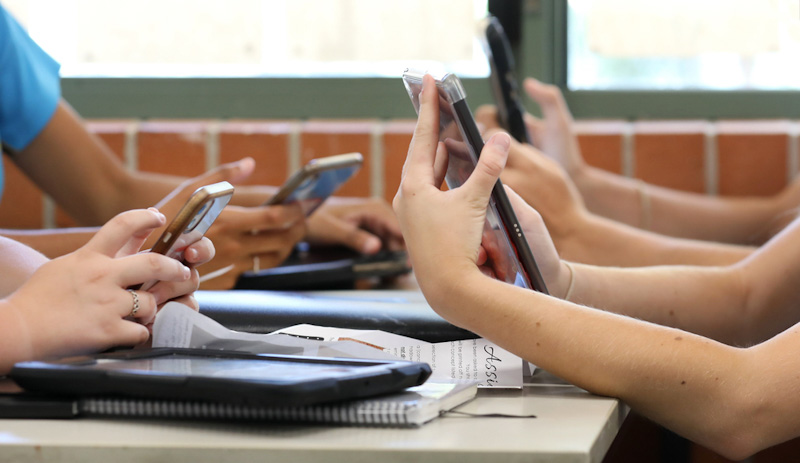Hold the Phone: K-12 school electronic device policies must be carefully considered, lawyers say

At least eight states now have policies banning or restricting cellphones in classrooms, according to a Kaiser Family Foundation report published in September 2024. (Image from Shutterstock)
As more school districts tighten up student cellphone policies on campus, three reasons are often cited for the changes: cyberbullying frequently takes place through technology, the devices are distracting for kids with already short attention spans and electronics can impede face-to-face communication.
Lawyers, however, caution that the policies should not be as simple as prohibiting phones on campus. Besides considering accommodation issues with cellphone use, as well as fairness, many attorneys advise school administrators to take a commonsense approach to creating and implementing the policies.
“I am immediately alerted if I hear that a cellphone policy is a zero-tolerance policy or if the discipline seems to exceed the violation,” says Nicholas Simopoulos, a Richmond, Virginia, solo practitioner.
Simopoulos, who practices education law, says that cellphone policies should be written with factors for administrators to weigh when considering discipline, such as the circumstances in which a student was caught using a cellphone. Was that student trying to contact a parent because of illness? Is the student suffering from anxiety? Is this a first-time offense? Was it during after-school hours on campus?
“Certainly, states and school districts can regulate student conduct if it causes material or substantial disruption to education. We all know there’s a concern that cellphones have created an unfocused and disruptive classroom environment,” he adds. “But there are times when students need to use their cellphones, and policies should consider that.”
At least eight states now have policies banning or restricting cellphones in classrooms, according to a Kaiser Family Foundation report published in September 2024. In Virginia, for example, Gov. Glenn Youngkin issued an executive order to ban cellphones, while other states have opted for a legislative approach.
Some schools require cellphones be stored in a locked pouch during the school day. Often, the locked pouch stays with the student. Other school districts follow different approaches, such as allowing cellphones to remain accessible, but out of sight during classroom time.
 “There was a time when schools, especially high schools, started to embrace the cellphone as an entry-level technology,” says Brian Gruber, who represents the parents of students with special needs through his boutique firm in Rockville, Maryland, adding that more recently, the policies are tightening.
“There was a time when schools, especially high schools, started to embrace the cellphone as an entry-level technology,” says Brian Gruber, who represents the parents of students with special needs through his boutique firm in Rockville, Maryland, adding that more recently, the policies are tightening.
Florida passed a phone ban that not only prohibits cellphone use during class time but also blocks access to social media for all devices connected to school Wi-Fi except for educational purposes. In California, Gov. Gavin Newsom signed off on a law in Sept. 2024 requiring every school district, charter school and county office of education to adopt a policy limiting or banning the use of cellphones by July 1, 2026.
Marc. L. Terry, who represents school districts, emphasizes the importance of having clear policies that set expectations with both students and parents and consistent enforcement.
In addition, Terry says, administrators and faculty need to “buy in to a common approach.”
“Administrators tend to understand that consistent enforcement of rules is an important aspect of their job,” says Terry, a partner at Mirick, O’Connell, DeMallie & Lougee in Westborough, Massachusetts. “Inconsistent enforcement can certainly create legal issues, and it’s important sometimes to take a step back and make sure that isn’t happening.”
In Oregon, state law requires that every school district have a policy about cellphone use. Each of the 197 school districts is permitted to set its own rules. In October 2024, the state’s education department recommended that school districts work with staff, parents and students when creating their policies and ensure that cellphones are kept in designated places that reduce concerns about theft, loss or damage.
Educators have been complaining about the disruptions that cellphones cause in classrooms for years. According to a Pew Research Center study conducted in 2023 and released in 2024, 72% of high school teachers found that cellphones in the classroom caused problems. A 2024 National Education Association poll revealed that 90% of pre-K-12 teachers supported prohibiting the use of cellphones during classroom instruction.
And policies restricting cellphone access in schools aren’t new. In 2009, 91% of schools had policies limiting use. But then schools drifted toward a more lenient approach to cellphones, according to the National Center for Education Statistics. And with the pandemic, restrictions were loosened further, says Brian Gruber, who represents the parents of students with special needs through his boutique firm in Rockville, Maryland.
“There was a time when schools, especially high schools, started to embrace the cellphone as an entry-level technology,” he explains, adding that more recently, the policies are tightening.
About nine in 10 public schools report occurrences of cyberbullying through technological devices, including cellphones, according to the Kaiser Family Foundation report. School officials also must consider laws such as Title IX of the Education Amendments Act of 1972 when it comes to addressing cellphone rules.
 “We have seen lawsuits filed by students against school districts alleging that the students were bullied via cellphone and social media and alleging that the school district should have done more to prevent the bullying,” says Haley Percell, chief legal officer and interim deputy executive director for the Oregon School Boards Association.
“We have seen lawsuits filed by students against school districts alleging that the students were bullied via cellphone and social media and alleging that the school district should have done more to prevent the bullying,” says Haley Percell, chief legal officer and interim deputy executive director for the Oregon School Boards Association.
“We have seen lawsuits filed by students against school districts alleging that the students were bullied via cellphone and social media and alleging that the school district should have done more to prevent the bullying,” says Haley Percell, chief legal officer and interim deputy executive director for the Oregon School Boards Association. She also chairs the Council of School Attorneys’ steering committee.
And experts continue to raise concerns that cellphone use is hurting the younger generation’s mental health and well-being. Half of young people between 12 and 17 spend at least four hours per day on their cellphones, according to a study released in November 2024 by the U.S. Centers for Disease Control and Prevention.
The study also found that 27% of teens who spent four or more hours per day with screen time said they had experienced anxiety in the prior two weeks compared to 12.3% of teens with less time spent staring at screens. The report emphasized that high levels of phone screen time have been linked to poor sleep habits, fatigue, anxiety and depression.
The Kaiser Family Foundation report, however, found that research on the effectiveness on cellphone bans has been mixed, with some studies showing improved student mental health and academic performance, and other studies showing minimal to no change in student outcomes.
Parent pushback
There has been some criticism of cellphone bans. In September 2024, the National Parents Union, which describes itself as the “united, independent voice of modern American families,” released a poll surveying 1,508 parents of public school students. The survey found that 78% of parents polled wanted students to have cellphone access during school hours in case of an emergency and 58% said that they wanted students to have cellphone access so parents could keep in touch with their children or find out where they are when needed.
“Despite what so-called ‘experts’ might think, we aren’t texting our kids memes or asking them what the latest TikTok trend is,” said Keri Rodrigues, president of the National Parents Union, in a press release. “Before policymakers think they’re solving a problem by banning phones in school, they should talk to actual parents to understand the reasons why the line of communication during the school day is so important.”
Percell says that school boards and administrators should engage with their community and discuss data regarding the negative impact of cellphone use before implementing policies.
“If parents are currently using cellphones to contact their children while they are in school, the school will need to be prepared to take over those parent-to-student communications and explain to the community how that process will work,” says Percell.
Student concerns
Some students with disabilities or special needs have access to cellphone written in their specialized education plans. For example, a diabetic student may require a cellphone to monitor glucose readings.
“There is a tension between the cellphone as a reasonable accommodation tool because of its fabulous functionality, such as its ability to be a digital recording device and overly restrictive but well-intentioned school district policies,” says Gruber. “The problem with any sort of school policy is there is no one size fits all when you are talking about kids with special needs.”
In addition, Gruber is concerned about the “epidemic of students with school anxiety and school avoidance,” and how denying these students their cellphones may affect their well-being. However, he adds that cellphones “can be a distraction for students whose attention may already be compromised” and “are often observed to be a barrier to face-to-face communication.”
Another concern with more restrictive polices is whether they explicitly or accidentally give administrators or teachers access to students’ private information on their phones.
“Schools should have a policy in place addressing search and seizure on school property and make sure they are staying within constitutional limits when conducting searches of a student cellphone,” says Percell.
Kenneth M. Walker II, general counsel for the Austin Independent School District, says that lawyers creating cellphone policies should examine how the phones are being stored and who is responsible for them if students aren’t allowed to keep them.
“Could they be stolen? Could a teacher have access to a student’s personal information on their phone?” says Walker, chair-elect of the Council of School Attorneys. “We don’t want to try to solve one problem only to create other ones.”



